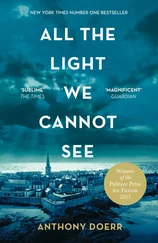Amnesty. A ridiculous surname. What does it mean? A pardon? A reprieve? But more permanent than a reprieve, isn’t it? Amnesty is for wrongdoings. For someone who has done something wrong. She will ask Pheko to look it up when they get home. Or maybe she will remember to look it up herself.
The nurse is talking.
“And the remote stimulator is working well? Do you feel any improvements?”
“Improvements?” She thinks so. Things do seem to be improving. “Things are sharper,” Alma says. She believes this is the sort of thing she is supposed to say. New pathways are being forged. She is remembering how to remember. This is what they want to hear.
The nurse murmurs. Feet whisper across the floor. Invisible machinery hums. Alma can feel, numbly, the rubber caps being twisted out of the ports in her skull and four screws being threaded simultaneously into place. There is a note in her hand: Pheko is in the waiting room. Pheko will drive Mrs. Alma home after her session. Of course.
A door with a small, circular window in it opens. A pale man in green scrubs sweeps past, smelling of chewing gum. Alma thinks: There are other padded chairs in this place, other rooms like this one, with other machines prying the lids off other addled brains. Ferreting inside them for memories, engraving those memories into little square cartridges. Attempting to fight off oblivion.
Her head is locked into place. Aluminum blinds clack against the window. In the lulls between breaths, she can hear traffic sighing past.
The helmet comes down.
THREE YEARS BEFORE, BRIEFLY
“Memories aren’t stored as changes to molecules inside brain cells,” Dr. Amnesty told Alma during her first appointment, three years ago. She had been on his waiting list for ten months. Dr. Amnesty had straw-colored hair, nearly translucent skin, and invisible eyebrows. He spoke English as if each word were a tiny egg he had to deliver carefully through his teeth.
“This is what they thought forever but they were wrong. The truth is that the substrate of old memories is located not inside the cells but in the extracellular space. Here at the clinic we target those spaces, stain them, and inscribe them into electronic models. In the hopes of teaching damaged neurons to make proper replacements. Forging new pathways. Re-remembering.
“Do you understand?”
Alma didn’t. Not really. For months, ever since Harold’s death, she had been forgetting things: forgetting to pay Pheko, forgetting to eat breakfast, forgetting what the numbers in her checkbook meant. She’d go to the garden with the pruners and arrive there a minute later without them. She’d find her hairdryer in a kitchen cupboard, car keys in the tea tin. She’d rummage through her mind for a noun and come up empty-handed: Casserole? Carpet? Cashmere?
Two doctors had already diagnosed the dementia. Alma would have preferred amnesia: a quicker, less cruel erasure. This was a corrosion, a slow leak. Seven decades of stories, five decades of marriage, four decades of working for Porter Properties, too many houses and buyers and sellers to count—spatulas and salad forks, novels and recipes, nightmares and daydreams, hellos and goodbyes. Could it all really be wiped away?
“We don’t offer a cure,” Dr. Amnesty was saying, “but we might be able to slow it down. We might be able to give you some memories back.”
He set the tips of his index fingers against his nose and formed a steeple. Alma sensed a pronouncement coming.
“It tends to unravel very quickly, without these treatments,” he said. “Every day it will become harder for you to be in the world.”
Water in a vase, chewing away at the stems of roses. Rust colonizing the tumblers in a lock. Sugar eating at the dentin of teeth, a river eroding its banks. Alma could think of a thousand metaphors, and all of them were inadequate.
She was a widow. No children, no pets. She had her Mercedes, a million and a half rand in savings, Harold’s pension, and the house in Vredehoek. Dr. Amnesty’s procedure offered a measure of hope. She signed up.
The operation was a fog. When she woke, she had a headache and her hair was gone. With her fingers she probed the four rubber caps secured into her skull.
A week later Pheko drove her back to the clinic. One of Dr. Amnesty’s nurses escorted her to a leather chair that looked something like the ones in dental offices. The helmet was merely a vibration at the top of her scalp. They would be reclaiming memories, they said; they could not predict if the memories would be good ones or bad ones. It was painless. Alma felt as though spiders were stringing webs though her head.
Two hours later Dr. Amnesty sent her home from that first session with a remote memory stimulator and nine little cartridges in a paperboard box. Each cartridge was stamped from the same beige polymer, with a four-digit number engraved into the top. She eyed the remote player for two days before taking it up to the upstairs bedroom one windy noon when Pheko was out buying groceries.
She plugged it in and inserted a cartridge at random. A low shudder rose through the vertebrae of her neck, and then the room fell away in layers. The walls dissolved. Through rifts in the ceiling, the sky rippled like a flag. Then Alma’s vision snuffed out, as if the fabric of her house had been yanked downward through a drain, and a prior world rematerialized.
She was in a museum: high ceiling, poor lighting, a smell like old magazines. The South African Museum. Harold was beside her, leaning over a glass-fronted display, excited, his eyes shining—look at him! So young! His khakis were too short, black socks showed above his shoes. How long had she known him? Maybe six months?
She had worn the wrong shoes: tight, too rigid. The weather had been perfect that day and Alma would have preferred to sit in the Company Gardens under the trees with this tall new boyfriend. But the museum was what Harold wanted and she wanted to be with him. Soon they were in a fossil room, a couple dozen skeletons on podiums, some as big as rhinos, some with yardlong fangs, all with massive, eyeless skulls.
“One hundred and eighty million years older than the dinosaurs, hey?” Harold whispered.
Nearby, schoolgirls chewed gum. Alma watched the tallest of them spit slowly into a porcelain drinking fountain, then suck the spit back into her mouth. A sign labeled the fountain For Use by White Persons in careful calligraphy. Alma felt as if her feet were being crushed in vises.
“Just another minute,” Harold said.
Seventy-one-year-old Alma watched everything through twenty-four-year-old Alma. She was twenty-four-year-old Alma! Her palms were damp and her feet were aching and she was on a date with a living Harold! A young, skinny Harold! He raved about the skeletons; they looked like animals mixed with animals, he said. Reptile heads on dog bodies. Eagle heads on hippo bodies. “I never get tired of seeing them,” young Harold was telling young Alma, a boyish luster in his face. Two hundred and fifty million years ago, he said, these creatures died in the mud, their bones compressed slowly into stone. Now someone had hacked them out; now they were reassembled in the light.
“These were our ancestors, too,” Harold whispered. Alma could hardly bear to look at them: They were eyeless, fleshless, murderous; they seemed engineered only to tear one another apart. She wanted to take this tall boy out to the gardens and sit hip-to-hip with him on a bench and take off her shoes. But Harold pulled her along. “Here’s the gorgonopsian. A gorgon. Big as a tiger. Two, three hundred kilograms. From the Permian. That’s only the second complete skeleton ever found. Not so far from where I grew up, you know.” He squeezed Alma’s hand.
Читать дальше












